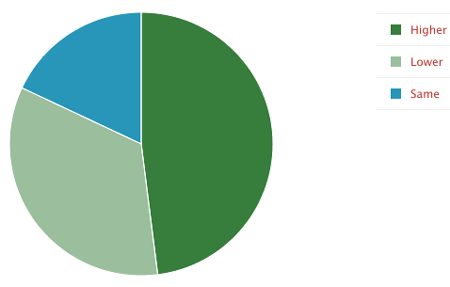Could E15 ethanol (a blend of 85% gasoline and 15% ethanol) be the economical answer to the nation’s higher fuel costs? The American Coalition for Ethanol (ACE) believes so.
 National surveys indicate that gasoline prices are up about 45 cents a gallon compared to a year ago, while ethanol prices have dropped more than 30 cents. Current ethanol wholesale prices are about 80 cents less than gasoline, says Ron Lamberty, senior vice president for ACE, a national advocacy association for the U.S. ethanol industry.
National surveys indicate that gasoline prices are up about 45 cents a gallon compared to a year ago, while ethanol prices have dropped more than 30 cents. Current ethanol wholesale prices are about 80 cents less than gasoline, says Ron Lamberty, senior vice president for ACE, a national advocacy association for the U.S. ethanol industry.
“At today’s prices, 10% ethanol blends are already saving consumers 8 to 10 cents per gallon compared to unleaded gasoline. Nationally, that saves almost $30 million dollars a day,” Lamberty says. “E15 could offer even greater savings. Drivers with vehicles new enough to use E15 could be saving 12 to 15 cents a gallon by choosing the E15 blend, potentially cutting gasoline costs by an additional $10 million dollars each day.”
E15 would benefit consumers and federal officials should immediately complete any work needed to allow marketers to offer the fuel for sale at stations across the country, Lamberty adds.
After years of testing by EPA and the Department of Energy, E15 was approved more than a year ago, as an option for cars and light trucks built in 2001 and later.
“Ethanol opponents continue to create new roadblocks, claiming to be “pro-consumer” and “pro free market,” while they do everything they can to keep E15 – a tested, approved, safe fuel – off of the market. That causes consumers to over-pay for gas and it is the opposite of a free market.” says Lamberty. “E15 is approved as an option. Retailers don’t have to add it to their product slate and consumers don’t have to buy it. Yet there is considerable effort to continue misleading and frightening consumers into supporting this idea of an auto fuel Nanny Slate that only benefits the oil industry and those who depend on Big Oil’s support,” according to Lamberty.
“ACE is urging federal officials and Congress to get behind efforts to open up E15 for public sale to all vehicles that are 2001 and newer as soon as possible. It’s time that we allow American consumers the option to support a cleaner fuel that helps cut down on imports of foreign oil and supports American jobs. We think that the majority of Americans would be in favor of something this beneficial for consumers rather than supporting efforts that only go to increase profits for oil companies,” Lamberty said.
 UNICA reports that ethanol sales by mills in the South-Central region totaled 1.29 billion liters in January, a drop of 32.32% compared to the 1.90 billion liters sold during the same period in 2011. Of this year’s total for January, 1.24 billion liters remained in the domestic market and only 42.44 million liters were exported.
UNICA reports that ethanol sales by mills in the South-Central region totaled 1.29 billion liters in January, a drop of 32.32% compared to the 1.90 billion liters sold during the same period in 2011. Of this year’s total for January, 1.24 billion liters remained in the domestic market and only 42.44 million liters were exported.

 With the official roll out of the
With the official roll out of the 
 The
The  Biofuel and renewable chemical company executives, scientists and government officials from around the globe will speak in breakout sessions at
Biofuel and renewable chemical company executives, scientists and government officials from around the globe will speak in breakout sessions at  The coalition is asking members of Congress to support the inclusion of E85 in the Alternative Fuel Credit in the tax extenders package currently under review. In coordination with this effort, members of the Coalition for E85 will be in Washington this week to meet with their Congressional representatives to explain how E85 is defined as an alternative fuel everywhere in the U.S. code, except in the Internal Revenue Code and that amending the Alternative Fuel Tax Credit to include E85 would give the fuel the same tax status as other alternative fuels, such as compressed natural gas and propane.
The coalition is asking members of Congress to support the inclusion of E85 in the Alternative Fuel Credit in the tax extenders package currently under review. In coordination with this effort, members of the Coalition for E85 will be in Washington this week to meet with their Congressional representatives to explain how E85 is defined as an alternative fuel everywhere in the U.S. code, except in the Internal Revenue Code and that amending the Alternative Fuel Tax Credit to include E85 would give the fuel the same tax status as other alternative fuels, such as compressed natural gas and propane.  In this edition of “The Ethanol Report,” Renewable Fuels Association president and CEO Bob Dinneen talks about what this means for the challenge to the RFS, which is vital to the expansion of renewable fuels for the transportation sector of the United States. “In the absence of the tax incentive, what is providing the foundational demand for the ethanol industry is the Renewable Fuel Standard,” says Dinneen. “We think that program has proven to be tremendously successful in reducing our nation’s reliance on imported oil.”
In this edition of “The Ethanol Report,” Renewable Fuels Association president and CEO Bob Dinneen talks about what this means for the challenge to the RFS, which is vital to the expansion of renewable fuels for the transportation sector of the United States. “In the absence of the tax incentive, what is providing the foundational demand for the ethanol industry is the Renewable Fuel Standard,” says Dinneen. “We think that program has proven to be tremendously successful in reducing our nation’s reliance on imported oil.” A major issue in the oral argument was whether these groups were properly before the Court. The ethanol industry through the
A major issue in the oral argument was whether these groups were properly before the Court. The ethanol industry through the  “We are pleased that the environmental group petitioners realized that their challenges were so unlikely to succeed that they dismissed their case. We only wish that they had come to this conclusion before wasting the resources of the government and biofuels producers who had to defend the challenges in briefing,” added RFA President and CEO Bob Dinneen, who noted that the environmental groups decided to drop their claims on Friday.
“We are pleased that the environmental group petitioners realized that their challenges were so unlikely to succeed that they dismissed their case. We only wish that they had come to this conclusion before wasting the resources of the government and biofuels producers who had to defend the challenges in briefing,” added RFA President and CEO Bob Dinneen, who noted that the environmental groups decided to drop their claims on Friday.